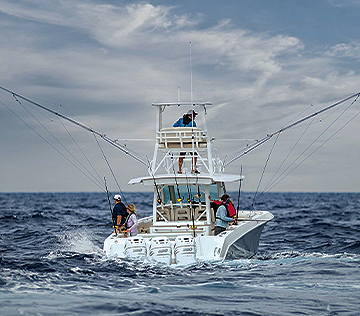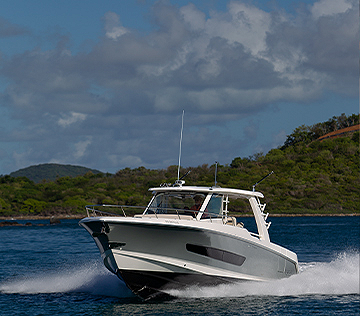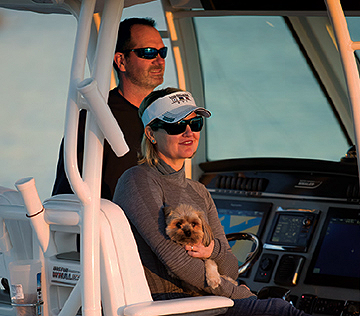
VHF vs Cell Phone on a Boat
Which emergency communication device do you need when you go boating?
Which is better to have onboard? The answer isn’t one-size-fits-all. It depends on where you boat, how far out you go, and what you need your device to do when it really counts.
Cell Phones: The Fair-Weather Friend
We all love our smartphones. They’re perfect for calm-day cruising close to shore—great for calling the marina, making dinner reservations, or texting your buddy to bring more snacks.
But here’s the catch: cell coverage ends where the adventure begins. Once you leave the harbor, signal bars start vanishing like a school of spooked baitfish.
Pros of a cell phone on the water:
- Easy to use, familiar, and everyone’s got one
- Perfect for private conversations
- Great in areas with solid coverage
Cons? It’s not built for marine emergencies. Your phone doesn’t float. It’s not waterproof (even if it claims to be). And it doesn’t broadcast a call for help to everyone in range—it just dials one number and hopes it connects.
VHF Radios: The Unsung Hero of the High Seas
Let’s talk about the real MVP: the VHF (Very High Frequency) radio. Born and bred for life at sea, this device is more than just a walkie-talkie—it’s your direct line to the Coast Guard, other nearby vessels, and vital weather updates.
Why VHF radios are preferred:
- Built-in weather channels (no app needed)
- Waterproof and floatable models available
- Line-of-sight communication that reaches other boaters instantly
- One-touch Digital Selective Calling (DSC) for distress signals with GPS coordinates
- Crew Overboard (MOB) function to mark the exact drop point
- When you're offshore and your phone says No Service, your VHF is still working the crowd, calling for help, and keeping you connected.
Who Needs a VHF Radio? (Hint: Probably You)
If you’re paddling around a lake on a kayak with your phone in a dry bag—maybe you’re fine. But the minute you venture beyond the breakwater or out of inland channels, you need a VHF.
It’s not just about calling the Coast Guard. A VHF can:
- Hail a nearby boat for a tow
- Coordinate with friends in the anchorage
- Keep you informed with weather alerts
- Broadcast your SOS if disaster strikes
Important note: VHF is public. Everyone tuned in nearby can hear you. So maybe don’t announce your secret fishing spot—or your credit card number.
VHF 101: How to Speak Radio Like a Pro
If you’re new to VHF, don’t sweat it—it’s not complicated, but it does have etiquette. Here’s your crash course:
Channel 16 is sacred – it’s the hailing and distress channel.
Start with:
"Boat name, boat name, boat name, this is [Your Boat Name], over."
Once the other party responds, switch to a working channel (e.g., “Let’s go to Channel 68.”)
Speak clearly, use one-digit-at-a-time for numbers (e.g., “one-six” not “sixteen”), and keep it short.
In an emergency, call out:
“Mayday, Mayday, Mayday”
Then: boat name, your location (latitude/longitude if possible), nature of the emergency, number of people aboard, and any medical needs.
For lesser but still urgent situations, say:
“Pan-Pan” three times for non-life-threatening but serious issues
“Securité” is used by the Coast Guard to broadcast safety advisories (listen up when you hear this)
And yes, the Coast Guard will tell you to hush if you’re hogging Channel 16 with idle chatter.
Signaling for Help: More Than Just a Call
Your VHF with DSC can do something no phone can: send an emergency alert to every boat within range—complete with your GPS coordinates. It’s fast. It’s loud. It saves lives.
Other backup signals include:
- Flares (red for distress, orange smoke for daytime)
- Flashing white light (like a strobe)
- Waving arms or raising an orange distress flag
- Five short horn blasts (the international distress signal)
Phones? They might call for help if they can connect. VHF? It’s already shouting for you.
So, VHF or Cell Phone? Here's the Real Answer
Why choose? Bring both.
A cell phone is great when things are fine. But when things go sideways, a VHF could be your only lifeline.
Today’s VHF radios are compact, waterproof, affordable, and even come with GPS and DSC built in. Fixed-mount or handheld, there’s really no excuse to hit the water without one.
Boating is freedom. It’s escape. It’s you and the open water. But it’s also unpredictable.
When the unexpected happens, communication is everything. Don’t leave it to chance. Don’t rely on bars that disappear. Equip yourself so your're covered.
FAQs
Q: Can I use a VHF radio without a license?
A: Recreational boaters don’t need a license for VHF use in U.S. waters.
Q: What’s the best VHF channel for chatting with friends?
A: Try Channels 68, 69, 71, 72, or 78A—those are non-commercial working channels.
Q: Does a handheld VHF have enough range?
A: Yes, especially with a clear line of sight. For greater range, a fixed-mount model with an external antenna is better.
Q: How much do VHF radios cost?
A: Handhelds start around $70, while fixed-mount units with GPS and DSC features are in the $150–$300 range.
Q: Should I monitor Channel 16 all the time?
A: Yes. It’s required when underway. It’s how you hear distress calls—and how others hear yours.
Read more boat safety tips before you head out on the water.
This is for general information purposes only. Your use or reliance on any of the information in this Blog is solely at your own risk. Under no circumstance will we have any liability for any loss or damage of any kind incurred as a result of the use of any of the information provided.
Options and features mentioned subject to change. Please confirm availability of all accessories and equipment with an authorized Boston Whaler Dealer.



